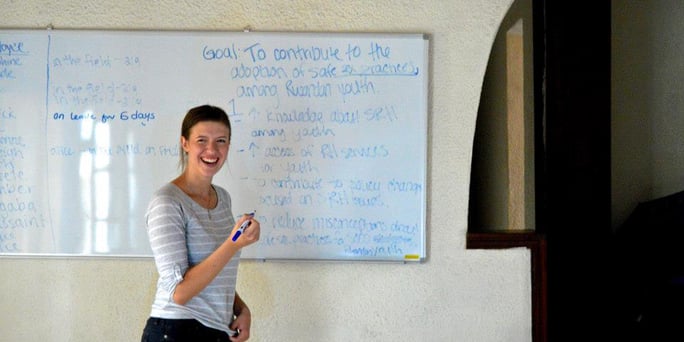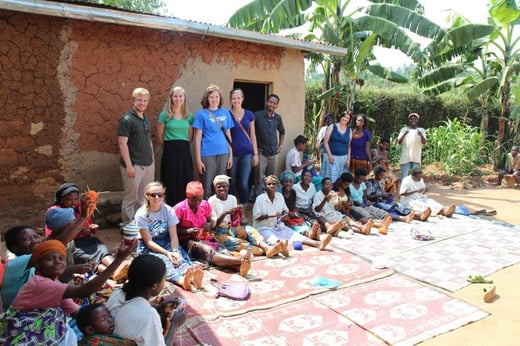
Bethany Larsen is a former Director of Development for a Rwandan public health non-profit organization. She signed up for HBX CORe to aid her transition from the non-profit field to social entrepreneurship and to help prepare her for an MBA program.

Why did you decide to sign up for HBX CORe?
Before HBX CORe, I had no business experience. I graduated in 2013 from a liberal arts school with a BA in Anthropology. I then moved to Kigali, Rwanda to work with a local public health non-profit organization where I spent the next two years. I have always had a passion for international development, but during my time in Rwanda, I felt limited in what I could offer within the foreign aid system.
I began to shift my sights to social entrepreneurship in the hopes of finding the best way to use my skills to create change. I am currently in transition from non-profits to business, so I signed up for CORe because I was looking for a program that would give me the vocabulary and the tools I needed to get started.
What was your favorite part of the program?
The platform was engaging, innovative, and it allowed me to interact with the material in a way that I never expected from an online course. The professors were incredible, and the way they used cases to support their lessons allowed studnets to connect the material to real-world examples that not only aided understanding and retention, but also application.
My favorite part of the program, though, was the peer discussions. I learned so much from asking and answering peer help questions and engaging in debates with other students both on and off the platform. The students in CORe supported me as I learned new concepts and challenged me to question my assumptions about issues like drug pricing and minimum wage. I am truly grateful for their insight and support.

Bethany in front of Cotopaxi, an active volcano in Ecuador that she and a group of friends hiked.
How are you applying what you've learned in CORe?
On a very basic level, I went from having zero accounting knowledge to understanding the language of business, which has been incredibly empowering. I now understand financial statements and can read the Wall Street Journal without using Investopedia every two seconds.
I have also been able to apply CORe directly in the workplace. For example, I do a lot of e-mail marketing in my current position, so I started with A/B marketing after Module 3 in Business Analytics.
"Those skills are all very useful, but I think my biggest takeaway from CORe is a new perspective on complex business challenges. This lens has given me a more balanced perspective on sensitive topics like LIFO reserves, minimum wage, and drug pricing that will make me a more informed citizen and wiser leader."

Bethany with a group of summer volunteers that conducted a knitting training for afemale artisan cooperative in Cyaruzinge, Rwanda. Knitted goods are a fairly new market in Rwanda, so the women were hoping to use this training to differentiate themselves from their competitors.
Any advice for people who will be taking CORe?
First, be prepared for a time commitment. I think there's an assumption with online courses that the material will be less demanding than if it were taught in a regular classroom, and with CORe this is simply not true. The material is challenging, especially for students like me who had no prior business experience. It takes time not only passing through the modules, but also participating in peer discussions, both of which are extremely important for mastering the material.
That said, it is definitely possible to complete the course and participate while juggling a hectic schedule. There were rockstars in my cohort who were running their own businesses and had newborn infants at home yet still managed to complete the course while being active participants. You just need to be honest with yourself about whether or not you are ready to make CORe a priority.
Second, connect! CORe brings together a diverse group of students from a range of countries, ages, and backgrounds that have deeply rich experiences in fields ranging from engineering to non-profits. Take advantage of the opportunity to meet so many great peers! Attend (or organize!) a meetup near you, join the Facebook group, and reach out to as many people as you can. I have met so many people who have challenged and inspired me through CORe, and the experience would not have been the same without them.
The CORe community consists of a rich and diverse group of learners. Want to learn more about other students who've participated in the program?




 Going out for drinks or dinner is fine as long as it's in a place that isn't too loud, but it can be awkward if you're not a natural conversationalist. Some students also use meetups as a study group or a way to further discuss course concepts!
Going out for drinks or dinner is fine as long as it's in a place that isn't too loud, but it can be awkward if you're not a natural conversationalist. Some students also use meetups as a study group or a way to further discuss course concepts!





